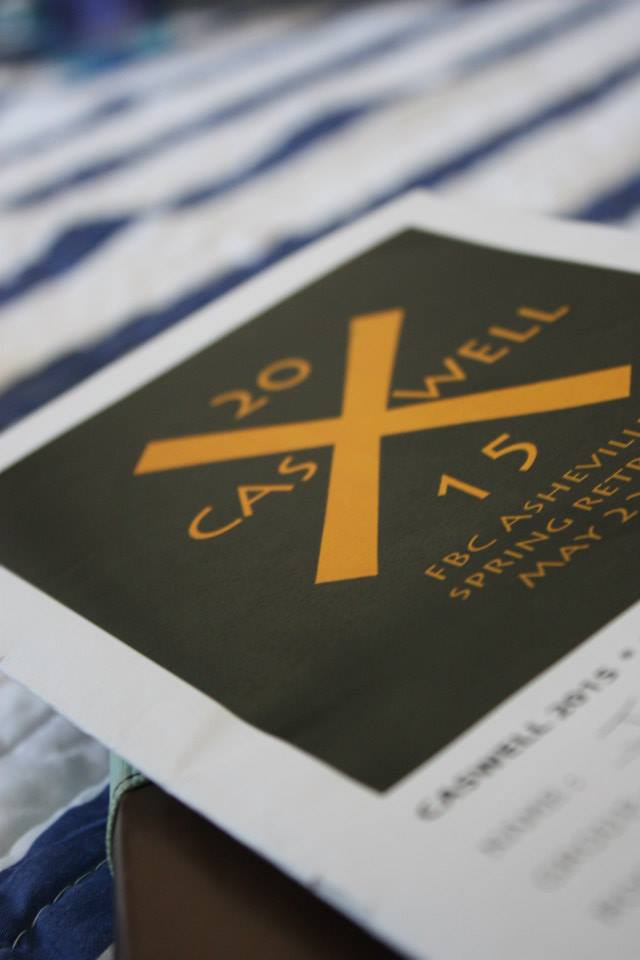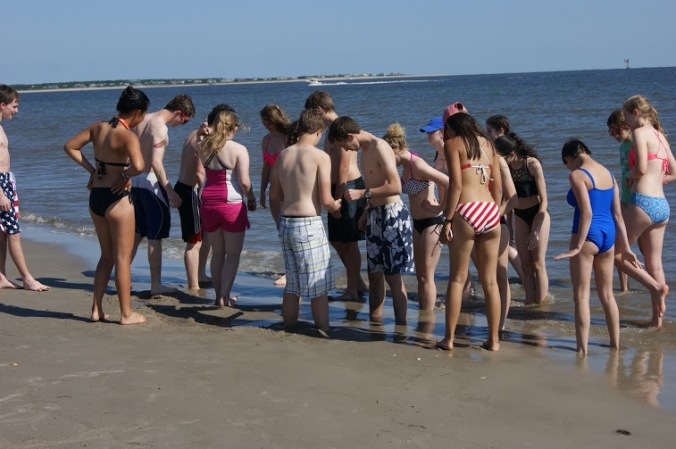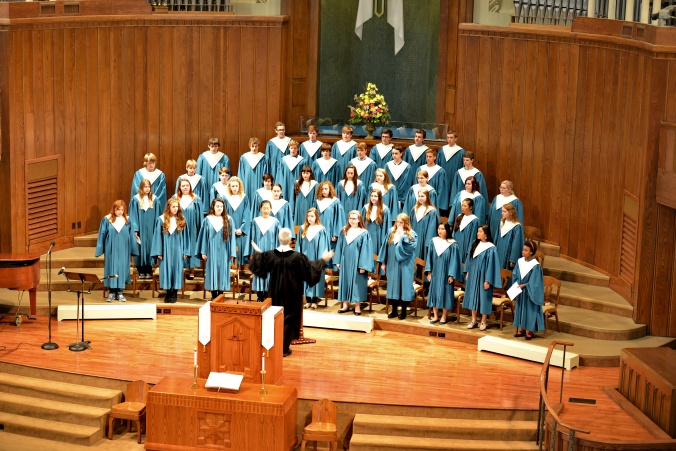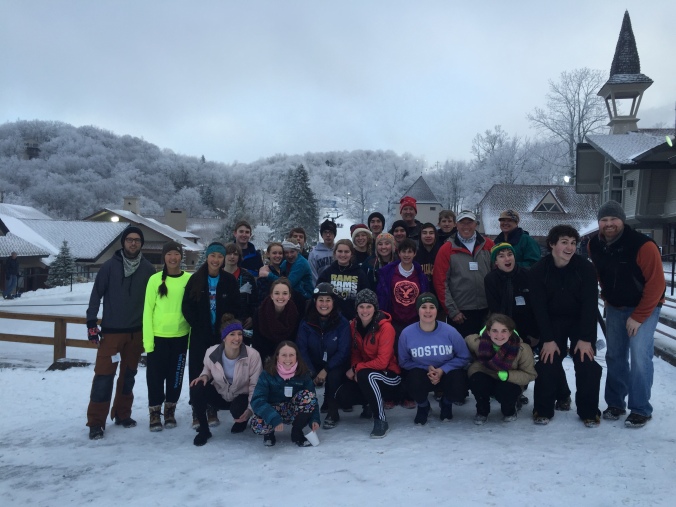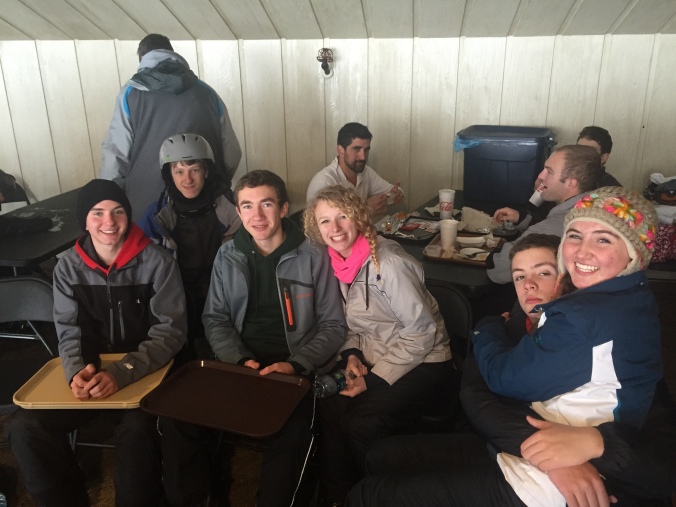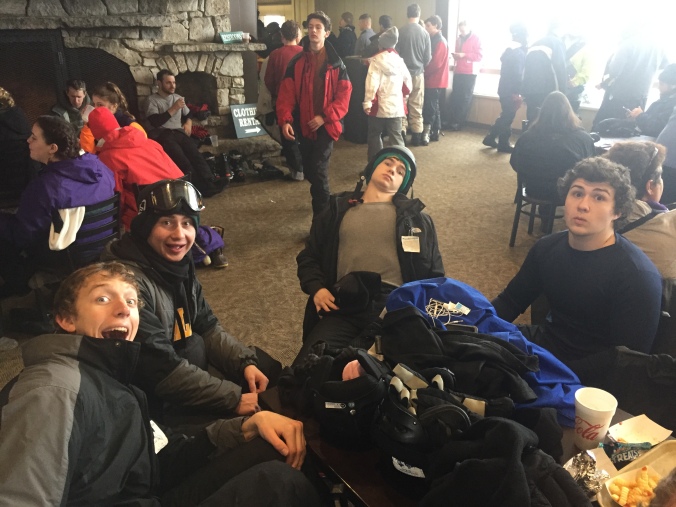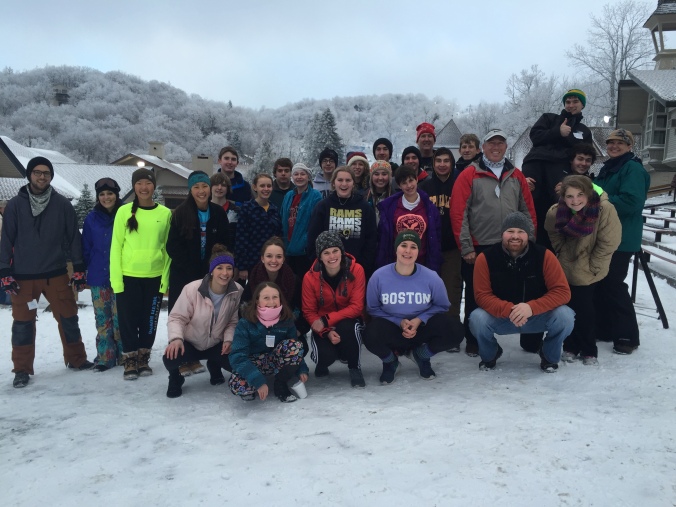Winning = Losing (sometimes)

Winning = Losing. At least, sometimes. Hear me out:
This past weekend, we took two buses of youth to Skyzone, an indoor trampoline park that takes simple things like jumping, dunking, and dodgeball to a whole new level—vertically and otherwise. Once we ridded ourselves of all potentially harmful jewelry and accessories and became decked out in their ultra-grippy orange socks, we spent 90 exhausting minutes playing all sorts of simple games as we maneuvered in their springy trampoline-filled world. Some of us jumped in the foam block pit. Some of us dunked basketballs, hung on the rim, and imagined for a moment that we could compete in the NBA dunk contest. Some of us played incredibly addictive games of dodgeball, where everyone got pegged by a rubber ball at least once. Some of us worked on our own gymnastic routines and mid-air dance moves. All of us played.
I played in about 10 dodgeball matches. I lost every one of them. So did everyone else from our group. Well, except for Rachel G., who managed to outlast all other players for one glorious game. Aside from that anomaly, we were all losers—no match for the guy in the tank top, or the guy in the superman shirt, or the guy who clearly worked at Skyzone but decided to dominate the dodgeball court during his break. Yep, despite our good efforts and best intentions, we all lost. And yet, I walked away (bounced, actually) feeling like we all won, ESPECIALLY since we had lost.
What am I talking about? If you were there to see those few overly-serious dodgeball competitors staring us down, you’d know what I’m getting at. The guys who frequent Skyzone every weekend and claim that springy dodgeball court as their own. (By the way, they’re also the guys who can do pretty amazing flips and airborne stunts. So I may be a tad bit jealous of their frequent trampoline time.) Of course, nowadays, you don’t have to go to Skyzone to see this sort of extremely-intense reality. Simply stop in on a kids’ soccer match or teenage dance competition. Stand behind the dugout at a little league game or on the dock at a youth regatta. Things that are technically for “sport” and recreation have virtually all been swallowed up into a state of hyper-competition, where kids and teenagers are pushed towards victory (internally and externally) at an often unhealthy pace.
Now, to be clear, I love to win. I played three sports throughout high school and took my roles very seriously. The guys who play “Old Man Basketball” on occasional Sunday afternoons know that I still take these games seriously, in that I play hard, talk a little friendly trash talk, and typically use all of my available fouls. BUT I also have fun and long for each player on the court to share in that fun. I realize that while some games, matches, and competitions have to be super serious and ultra competitive, all of them don’t. And really, as far as our teenagers go, they need a lot more opportunities to just play, devoid of any scoreboard, awards, winners or losers.
Here at First Baptist Church of Asheville, it’s very clear that we have incredibly talented teens. And diversely so, as they are competent and capable in everything from drama to dancing, volleyball to violin. They’ve been nurtured academically, athletically, and artistically. And that’s very good! But they’re also ridden with anxieties and social pressures around areas of life that shouldn’t be so serious. It’s the social stream they’ve been swimming in their whole lives, and it’s exhausting.
That is why when we have a chance to simply gather as friends in faith and play, it is a good thing. Absent of any winners or losers. It’s also why there is an increasing need for counter-cultural leagues that favor skill building, teamwork, and integrity over the contagion of hyper-competition and the winning-at-all-costs mentality.
When I was young, my grandmother made me memorize the 100th psalm. King James wording, of course. The first line proclaims, “Make a joyful noise unto the Lord, all ye lands.” Taking these words to heart, it is clear that the motivation behind the music should be the glory of God, and the means in which we do this should be joy. Not precision, though every musician strives for that. Not perfection, though that too would sound nice. Truthfully, if we concentrate on precision and perfection, we may very well end up missing the point of glorifying God, not to mention exclude all of those who are musically out of tune. This same concept should apply to our recreation and play. We need to recover the joyful intention behind sport, the kind that can make losing just as victorious as winning. The kind that recognizes the blind ambition to win as an unsettling defeat. Play a joyful sport unto the Lord, all ye lands. This is no easy mandate, but it should be worth a go at it.
Along the Journey…
CC
[For additional reading, explore these three links that talk about this subject from different angles:
Race to Nowhere; The Only Six Words Parents Need to Say; NCAA Probability]
Skyzone Pictures!
You are the Body of Christ! (Youth Sunday 2015)
4 eyes welcoming people to church (6 if you count a pair of glasses). 4 seniors offering thoughtful reflections. 6 hands providing sign language. 34 other hands either ringing bells, strumming guitar, or playing strings. 24 feet upholding students as they proclaim scripture, read prayers, and share stories. 10 more feet moving among the congregation to receive the offering. 43 mouths singing in the Asheville Youth Choir. 55 teenage hearts and minds engaged in worship leadership during one ordinary and yet extraordinary hour of worship. 1 Body of Christ. There are lots of ways to tell the story of worship from Youth Sunday, and these pictures should help. Well done, students! And well done, teachers, mentors, directors, and parents! To God be all the glory both for that hour of worship and for uniquely creating and calling each one of us to serve as members of the Body of Christ. All of us belong; and all of us have ways to serve! 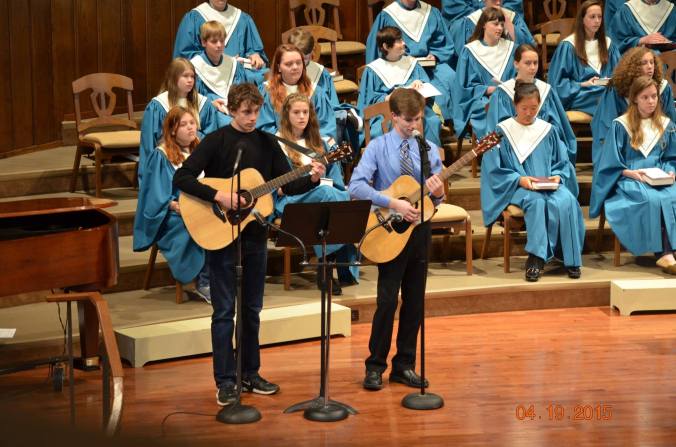




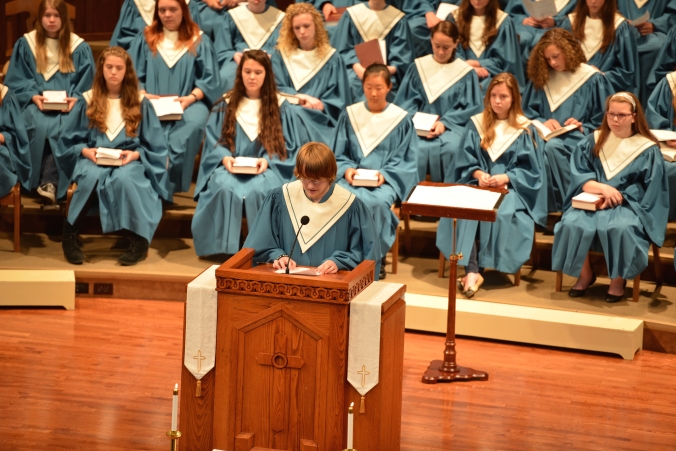
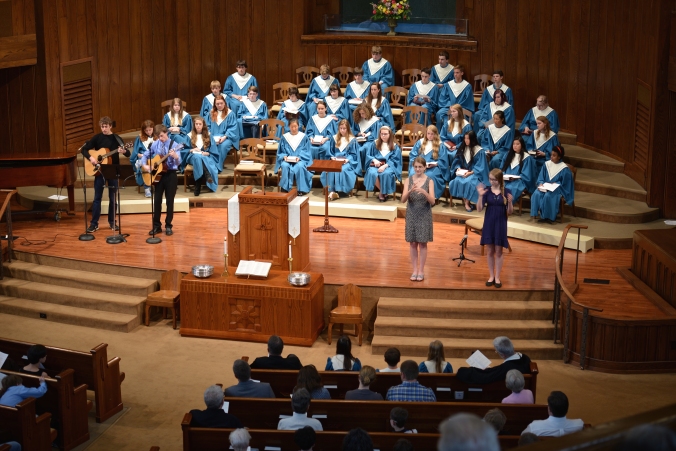
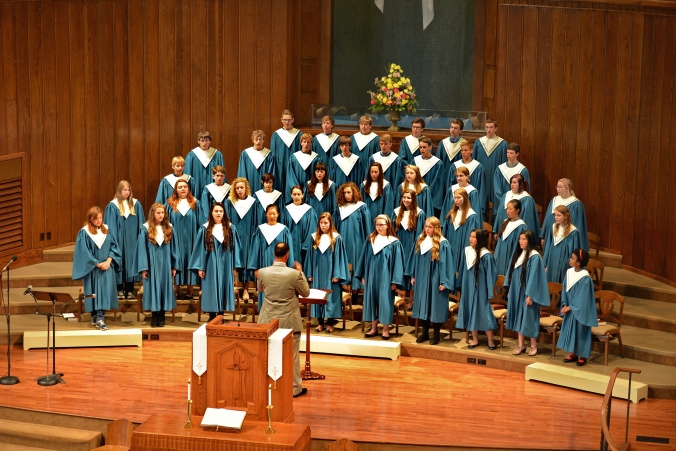


Eye to Eye
“When the beggar saw Peter and John about to go into the temple, he asked them for some money. Peter and John looked at him intently, and Peter said, “Look at us!” The lame man fixed his attention on them, eagerly expecting a gift. But Peter said, “I have no silver or gold, but what I have I give you; in the name of Jesus Christ of Nazareth, stand up and walk!” (Acts 3:3-6)
There’s a deeply spiritual and sacred connection that happens when we lean over the ledge of own insecurities and peer into the soul of another child of God. The kind of phrase that normally seems so egotistical (“Look at me, look at me!”) suddenly becomes the gateway to see recognize another child of God, to acknowledge the Christian truth that there is only one level at the foot of the cross.
The Dirtiest Word in the English Language

According to the late Fred Craddock, the dirtiest word in the English language is EXCLUSIVE. And I agree.
In my last writing, I talked about cuss words. But we all know that there are plenty of family friendly words that can cut much deeper than a thoughtless four-letter word. Hearing the word “exclusive” only sounds good when we’re on the inside, when we’re behind the sturdy fences, invited to the fancy dinner, wearing the Members Only jacket [actually, I don’t think those have ever really be seen as cool or exclusive].
As long as there have been human groups and organizations, there have been questions of exclusivity. Who’s in? Who’s out? What do you have to do to make it in? And once in, can you ever get kicked out? The Church is no exception here, and has unfortunately been guilty of preaching this dirty word for as long as it has existed. Women, foreigners, slaves, children, sick people, poor people…or most recently, gay people. God only knows how many have been hurt, judged, excluded, and “cut-off” from the Body of Christ. Of course no one can withhold the Love of Christ from people, but that doesn’t mean people haven’t tried (I’m thinking of another recently deceased Fred: Fred Phelps, who had nothing else in common with the beloved Fred Craddock than a shared first name).
Going back to the earliest writings of those first Christians, we can hear their leaders wrestling with the timeless question of exclusivity. Consider Acts 8, a passage about the nature of exclusivity in the holy practice of baptism. In that context, baptism was not only an act of true repentance, but also an entry way into the Christian community. The first big story is about a street performer (1st century magician) who was himself amazed at the ‘magical’ acts of the Christian apostle Philip; but no matter how much he tried, he couldn’t discover the hidden tricks behind Philip’s power. And so, Simon the street performer believed in the God who couldn’t be explained away, and he was baptized. Not too long later, though, he tried to purchase the rights to perform Philip-like acts, probably hoping to regain his once held abilities to astonish others on the local street corners. So was Simon kicked out of the church? Was his baptism certificate revoked? NO and NO. But he is given a stern lecture by the early church leaders, who make it clear that things are different in the Kingdom of God than in the kingdom of mankind: you can never buy your way in! Simon the baptized street performer is held accountable, but he’s not kicked out of Christian fellowship.
The rest of Acts 8 is about the unforeseen baptism of a total outsider: an Ethiopian eunuch, who is about as different as someone could have been from a Middle Eastern Jew or Roman citizen. This outsider, different in every way in beliefs and backgrounds, is nonetheless captivated by the story of Christ and finally asks the apostle Philip, “Look, water! What is to prevent me from being baptized?” The early church’s answer, as given by Philip (again): NOTHING! So the eunuch is baptized and then goes on his way to Ethiopia, taking with him the radically inclusive movement known as early Christianity.
So who is in and who is out? And who decides? The early church leaders didn’t come to any decisions easily, that’s for sure, but when all was said and done, it was usually a more inclusive, more accepting church than not. And as a Christian living in America 2,000 years later, who looks nothing like those first disciples, I have to say Thanks be to God!
Now, what will I say to the outsiders today, to those who sometimes get it wrong? Even if I’m not cussing, am I still uttering any dirty words to a single child of God?
Along the Journey…
CC
Why Will Smith Doesn’t Cuss
When he was 12 years old, Willard Smith (did you know his real name is actually Willard?) had his own rap journal, where he wrote all sort of “dope” lyrics down, hoping to one day make it big and become a rapper. Like most every other hip hop rapper he wanted to emulate, he used plenty of cuss words in his raps.
And then one day his grandmother (“Gi-Gi”) found his rap journal. In the last page, she added her own entry, aimed right for her beloved 12 year old rapper-in-training:
Dear Willard,
Truly intelligent people do not have to use words like this to express themselves. Please show the world that you’re as smart as we think you are.
Love,
GiGi.
From that point on, Will Smith set out to never use cuss words in his music. He’s slipped only a few times in the 3 1/2 decades that have followed that life-changing moment.
When I was a campus minister at Clemson University, I told a story to my college students about my teenage experience of “breaking bad.” Playing off the tremendously powerful (though very dark) show on AMC, I shared about when I ventured into the “dark side” of adolescent temptation. Like Will Smith, I didn’t cuss. Also like Will Smith, I loved rapping, so I knew almost all of the lyrics to all of the best 90’s rappers (Tupac, Snoop Dogg & Dr. Dre, Ice Cube, Bone Thugs N Harmony, etc.). And basically all of the best songs had tons of cuss words, which I would always edit out. Until one day, when my cousin and I started thinking about the nature of cuss words, and how stupid they really are. “They’re just words! Anyone can say them! What’s the big deal about those specifically connected letters and sounds?”
And that’s when we broke bad. It looked like this: we went down to the very bottom of our neighboring pastures (our families both lived on small cattle farms), and then, once removed from all other human civilization, we cussed at the top of our lungs. We used every single possible combination of the 4-letter words we’d always avoided, shouting them up to the heavens, out over the innocent bystander cows. It felt liberating. It felt adult. It felt bad. And then it felt really stupid. And a little pathetic. Yes, they were just words, so how did saying them—whether in school halls, dinner tables, phone calls, or pasture bottoms—make you any more “cool”? As Will Smith’s grandmother said it, they effectively make you seem less intelligent, less smart. Rather than setting us off on a deep spiral of delinquent behavior, that really did the trick of getting the desire to “cuss like the cool people” out of our system. We didn’t need to change our talking patterns just to try to fit in or seem more popular. People were going to think whatever they were going to think about us, so why not worry about other things?
I have cussed since them. And so has Will Smith. Heck, [see what I did there?], he probably made his grandmother cuss a time or two, just as my toddler son or a stubbed toe occasionally prompt me to do. But there’s nothing cool about it, nothing worth adding to our socially-constructed identities. There’s certainly nothing Christ-like about it. Rappers like Eminem may continue filling his raps with cuss words in efforts to seem more edgy and sell more records, but in perspective, that’s really just as ridiculous as two teenage boys shouting out meaningless profanities at the bottom of their cow pastures.
Finally, brothers and sisters, whatever is true, whatever is noble, whatever is right, whatever is pure, whatever is lovely, whatever is admirable—if anything is excellent or praiseworthy—think about such things.
(Philippians 4:8, NIV)
Along the Journey…
CC
Cabin Fever Faith
In light of our recent weather patterns and school closings (and another one only hours away!), the term CABIN FEVER seems quite timely. My guess is that it’s one of those phrases used by teenagers AND senior adults and everyone in between, though its roots have been outdated for quite some time. [Side note: before you go Google Image Searching this phrase, be warned that this is also the name of a recent horror movie series, which I now have even less interest in ever watching.]
Cabin fever is what we get when we are cooped up too long in the same place, with the same people. A list of symptoms include irritability, restlessness, extreme boredom, prolonged exhaustion, and lack of any motivation whatsoever. You’ve seen this happen in the beach house, in the really long car ride, and most recently, in your own snow-covered homes. Cabin fever causes problems for all of us, as it threatens to chase off any spark of creativity or sense of gratitude. But here’s the thing: cabin fever is an even bigger threat to the Way of following Jesus.
Cabin fever faith can happen just like this:
1. You are a passionate follower of Jesus.
2. You are lovingly surrounded by many people who support, and encourage you.
3. Your thoughts and their thoughts start to align.
4. Your Christianity becomes very comfortable, even effortless. And so, naturally, you get more comfortable, and put in less effort.
5. You further insulate yourself with only those who really agree with you and with whom you have most things in common.
6. You start to resent new people who come in to the group. You’d rather things stay the way they are.
7. You are increasingly complacent and unsatisfied with what you “get out” of your faith. So you focus even more on yourself and less on others.
8. You go to worship and fellowships and projects, but your primary purposes are social. You don’t have time to go beyond the minimum responsibilities.
9. You realize you are no longer praying for anyone other than yourself, and even that’s rare.
10. You make faith a totally internalized, privatized, and relativized thing, just one small part of your public identity.
We’re not spending too much time in cabins off in the woods; we’re spending too much time in the cabins of our own self-construction. Our own phones, our own social games and social media profiles, our own busy schedules, our own rooms, our own earbuds, our own preferences for every single thing in life. We have so many other things competing for our time and attention, and they are all capable of serving us in some way, so why not think the same way about our faith?
Imagine a big snow coming (or just look out your window tomorrow morning). You see a neighbor struggling to shovel her driveway. You have a small instinct that perhaps you should go offer to help. But then you think better of it, knowing you’ve got your own things to worry about and accomplish for the day. And yet, you feel a little less content with your own self in that decision, and become a little less motivated and energized.
A few centuries, English poet John Donne penned the words, “No man is an island, entire of itself; every man [and woman] is a piece of the continent, a part of the main.” (For Whom the Bell Tolls, 1623). Picking up on this notion and applying it to the deeper calling of Christ, 20th century Trappist monk Thomas Merton writes,
“It is therefore of supreme importance that we consent to live not for ourselves but for others. When we do this we will be able first of all to face and accept our own limitations. As long as we secretly adore ourselves, our own deficiencies will remain to torture us with an apparent defilement. But if we live for others, we will gradually discover that no one expects us to be ‘as gods.’ We will see that we are human, like everyone else, that we all have weaknesses and deficiencies, and that these limitations of ours play a most important part in all our lives. It is because of them that we need others and others need us. We are not all weak in the same spots, and so we supplement and complete one another, each one making up in himself for the lack in another.” (No Man Is An Island, 1955)
Perhaps these next few days, you’ll find a new way to avoid cabin fever, and my guess is that it will be found in the decision to venture out. Out of your own doors, perhaps, as you go build a snowman or help shovel the neighbor’s drive. But also out of your own insulated, close-knit group of friends, as you find the courage to go up and talk to someone you usually ignore. Venture out of your own all-too-familiar and routine parts of following Jesus, perhaps by picking up a new practice, like a real Quiet Time in the morning, or reading through one of the entire gospel accounts (Matthew, Mark, Luke or John), or praying for someone else every night before you go to sleep.
Don’t keep your faith locked behind the doors of your own constructed cabin for fear of bitterly cold and uncomfortable surroundings. Open wide your doors of security and selfishness and allow Christ-like love and service to rush in. It’s the perfect cure to cabin fever.
Along the Journey…
CC
1 out of 10
I was a failure the first nine times I drove by Rarity Mountain, TN. Maybe it was raining, or getting late, or I was pressed for time [you know how so many guy in particular like to “make good time!”]. One time it was snowing. But often, the weather was fine, and the view from my rental car was just breathtaking, even at 75 miles per hour on I-75. Sadly enough, I was heading to and from Louisville, KY for classes related to Christian ministry, ethics, and theology. But though I would feel some sort of internal desire to take the exit and just stop
for
a
moment,
I always found a reason to keep on going.
Until that last time, which was after my final class, just a few weeks ago. Finally, on my tenth time driving through that part of those Tennessee mountains, I decided to stop. I took the aptly named “Rarity Mtn” exit and just parked my rental car on the ramp.
SIDE NOTE: if you’re ever driving by Exit 156 on I-75, you should stop. There is literally no reason for this exit except to stop; otherwise, the exit ramp just becomes the entrance ramp and you’re back on the interstate again.
I climbed the grassy hill and took the highest vantage point I could find. A time or two, I considered how this would be an opportune time for some troubled person to come and end my life. But for the most part, I just took took those moments are (unfortunately) rare occasions to breathe in God’s breath of beautiful life, and to breathe out true gratitude and praise.
And the picture doesn’t begin to do justice to the view.
It was here that I realized I may most often be like the 9 lepers who forgot to give thanks to Jesus after being healed. While staying at a distance from him, as lepers were required to do from all who were clean and whole, they yelled out, “Jesus, Master, have mercy on us!” He then told them to go and show themselves to a priest, which was the necessary way for lepers to be pronounced clean and welcomed back into community again. Of course, for that to work, the leprosy would have to be cured. And on this fateful day, without any real explanation other than their encounter at a distance with Christ, that’s just what happened! But high on the hype and excitement of newfound life and acceptance, 9 of the 10 lepers get on with their life, neglecting to return to Jesus and give thanks.
Only 1 came back. And, in typical, unexpected fashion, that 1 happened to be a Samaritan, an outsider (according to 1st century Jews). Jesus says, “Has no one returned to give glory to God except this foreigner? Stand up and go. Your faith has healed you.” (Luke 17:18-19).
Honestly, maybe we’re all like the 9 lepers most of the time. Though we may get small hunches to do something unexpected, to stop from our self-made busy lives, and go out of our way to recognize the work of God, we rarely do. That’s the lesson I learned for myself on Rarity Mtn, that one time when I actually took the time and acknowledge the ever-present work and blessing of God.
Here’s how I ended my own journaling entry on that lonesome and divinely encircled grassy hill:
Sunset is only a half hour away, and to my purposeful car I’ll return and speedily go my way home. But I’m grateful for this time and this place and this relentless call to PAUSE, TURN, & GIVE THANKS.
Along the Journey…
CC
